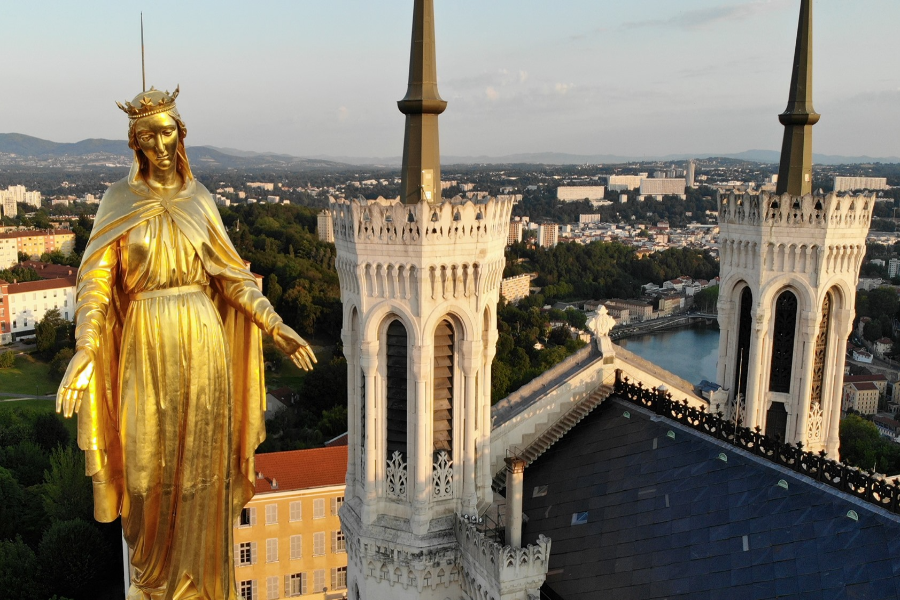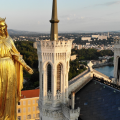NOTRE-DAME DE FOURVIÈRE BASILICA
The Basilica of Notre-Dame de Fourvière fascinates and intrigues by its whiteness and its unusual lines for a religious building.
Built in the late 19th century, the Basilica of Notre-Dame de Fourvière has become the sacred emblem of Lyon. Dominating the city from the top of the "hill that prays", the basilica fascinates and intrigues with its whiteness and unusual lines for a religious building, giving it the affectionate title of "upside-down elephant". The imposing edifice was built on the site of a Marian shrine, on which a small chapel dedicated to the Virgin Mary had been built. This sanctuary had to be enlarged over the centuries as pilgrims to Mary became increasingly popular. In 1870, Archbishop Jacques Ginoulhiac vowed to enlarge the sanctuary if the town was spared by the Prussian armies. The city was spared, and on December 7, 1872, the first stone of the edifice designed by architect Pierre-Marie Bossan was laid. Fourvière is a veritable "mystical citadel" of rough stone, flanked by four towers that give it the appearance of a fortress of faith. It's also a lacework of finely chiselled stone, lavishly decorated with mosaics, all inserted in a Byzantine style rarely used in France. From the dark crypt to the luminous church, visitors are offered a whole symbolic journey. While the decorations were far from complete - they would not be until 1964, a century after work had begun! -the consecration of Notre-Dame de Fourvière took place on June 16, 1896. Today, the basilica remains the most visited monument in the Auvergne-Rhône-Alpes region. To get to Fourvière, take the metro (funicular from Vieux Lyon), as parking spaces are scarce. Just off the metro station, Fourvière impresses visitors with its white western facade. From the forecourt, you can access the two churches that make up the edifice. The lower church, which is not really a crypt, is a real pilgrimage. The upper church, accessible by double-flight staircases, features mosaics telling the story of the Virgin Mary. The Fourvière museum houses superb pieces of sacred goldsmithery and fascinating temporary exhibitions. Another must-see is the Toits de Fourvière. After climbing 345 steps, visitors reach paradise as they walk across the roofs of the basilica, discovering what goes on behind the scenes. The panorama from up there is fantastic. Fourvière, Lyon's most beautiful "vision".
Did you know? This review was written by our professional authors.
The strengths of this establishment:
Members' reviews on NOTRE-DAME DE FOURVIÈRE BASILICA
The ratings and reviews below reflect the subjective opinions of members and not the opinion of The Little Witty.
Je conseille d'y aller au début du séjour : la vue permet de repérer la topographie de Lyon.
L'extérieure à été rénové depuis peu et la pierre rayonne à nouveau.
A l'intérieur ne pas louper l'horloge astronomique !
















L'histoire, le monument tout est vraiment beau sur ce site.
Le soir la vue sur Lyon est magique.